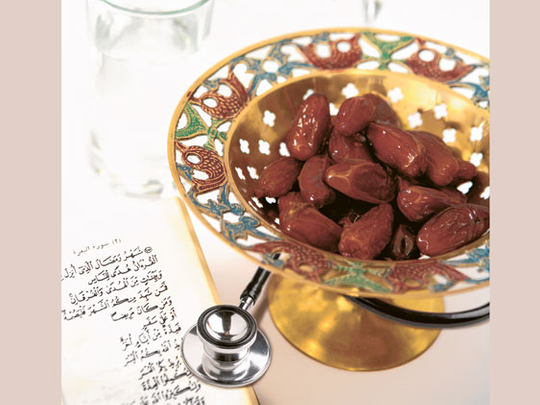
With Ramadan falling at the peak of summer this year, we are looking at 12-14 hours of fasting, longer than the average Ramadan hours. This is going to be extra difficult for those on regular medication but who insist on keeping their faith and following all rituals.
"When you are suffering from any chronic problem, you have to make certain adjustments to cope with any such events or duration of time such as Ramadan," says Dr Mohammad Hamed Farooqi, director and consultant endocrinologist, Dubai Diabetes Centre. "No religion, including Islam, puts a believer's life at risk by following certain religious edicts. The most important thing to do is to consult your doctor whether it is safe for you to fast. Secondly, you need to understand that this year Ramadan is falling at the height of summer. With your body already stressed out to begin with, it is important to make certain adjustments above and beyond what you would normally do. Another important factor to keep in mind is your fluid status. If you are able to replenish your fluid status correctly, you should do very well."
Rania Al Tawil-Ares, clinical dietitian at the centre concurs. "Fluid intake is very important, more so this year as it will be very hot and humid. Drink as much water as possible. Avoid juices, even fresh ones, as they contain sugar. Instead, have lemonade made from fresh lemon juice, water, fresh mint and sweetener."
Eat healthy
Farooqi and Tawil-Ares say what we eat will affect the condition during Ramadan.
"Fried items and fatty meals are the main issue," Tawil-Ares says. "We advise healthy food techniques because it's difficult to tell people not to eat what they like during Ramadan. Baking, steaming and grilling are encouraged. Secondly, it's important not to eat all the food at one meal. Divide iftar into smaller meals. You should break fast with maximum three dates because they belong to a very high glycaemic index that increase sugar. One to three dates with a cup of water or low fat laban is good. Then rest for 10-15 minutes and have soup or salad. Cooked vegetables are good too. Then have your main meal with chicken, fish or meat and bread or rice. For dessert it's advisable to take fruits rather than rich creamy puddings. Two-three fruit choices — one small apple or pear, a handful of strawberries or grapes. If you still want dessert, have a sugar-free jelly or pudding made from low-fat milk and sweetener instead of sugar (brown or white). For suhoor, take it as close to dawn as possible — not in the middle of the night. This helps to combat hypoglycaemia and hunger. But it should be a light meal. Maybe two brown bread slices with cheese, one cup of yoghurt, maybe one piece of fruit or three dates."
Farooqi and Tawil-Ares offer suggestions to maintain the following conditions.
Hypertension and diabetes: Diuretics are mainly used to treat hypertension. In effect, you are excreting fluids voluntarily to flush out the ailment. If you are on diuretics, then the doctor needs to help you adjust the medication. If possible, put it on hold during this month when you are already going to limit your fluid intake drastically.
There are two types of diabetics — ones who can control it with just diet and exercise and others who have to take medication. These are either on tablets to create insulin in the body or inject insulin directly. During Ramadan, what they need to do is preferably take long-acting insulin that can help them cover the period of fasting. Also eat appropriate foods — foods that release sugar slowly. Majority of people who have hypoglycaemia, are actually pre-diabetics and have to follow the right choice of food, as they are not on medication.
Avoid salt and salty foods. Processed food such as cheese, cured meat and readymade food, all have high sodium content. Diabetics should avoid salt as they are at a higher risk of getting hypertension. Vegetables are good for both conditions.
Anaemia: The most important thing to understand is why a person has anaemia. This is a kind of sign and can be for various reasons, including iron deficiency or bleeding through an organ. If it is of a significant degree, fasting should not be considered.
If it's iron-related, iron-rich foods such as red meats should be taken. But these can be high in cholesterol. Restrict these to two times a week and focus more on iron-rich vegetables. Vitamin C drinks are good but not necessarily orange juice. Lentils are a good source of iron and should be included in the diet.
Ulcers: Lot of the ulcers can be cured. But if you have a history of ulcers, the 12-14 hours fast will be of concern. Again, this will bring us down to our choice of food during suhoor.
Not all foods can cause ulcers. Identify foods that don't suit you. Avoid spicy, fried and fatty foods. Ghee (clarified butter) and caffeine are not good. Have green tea instead of regular tea. Sometimes, chocolate can affect you too. Don't sleep right after eating — wait for half an hour after eating and sleep at 45 degrees. Avoid tight clothes or belts.
Respiratory problems: In terms of fasting, these are usually not much of a problem. Inhalers can be taken and are not necessarily a sign of breaking one's fast. But if you are on oral steroids, obviously you should not fast.
Food does not really affect respiratory conditions. It can be more because of the weather. However, though there's not much substantial evidence, it has been seen dairy products can worsen the condition.
Heart conditions: If you are stable and your cardiologist advises, you can fast.










